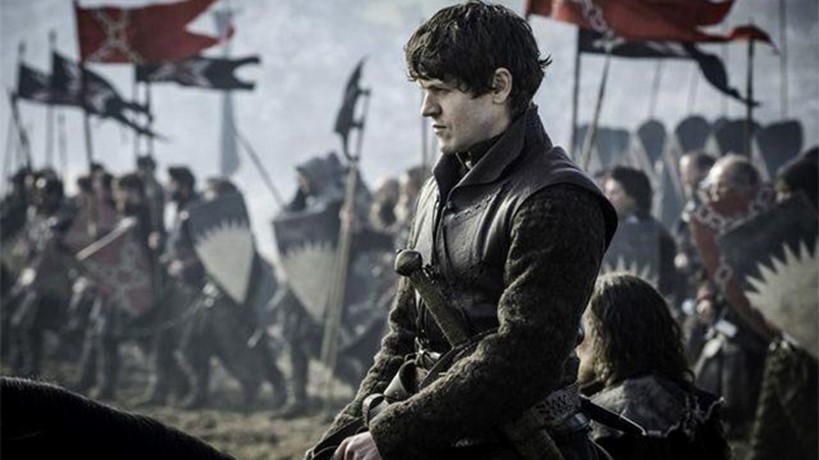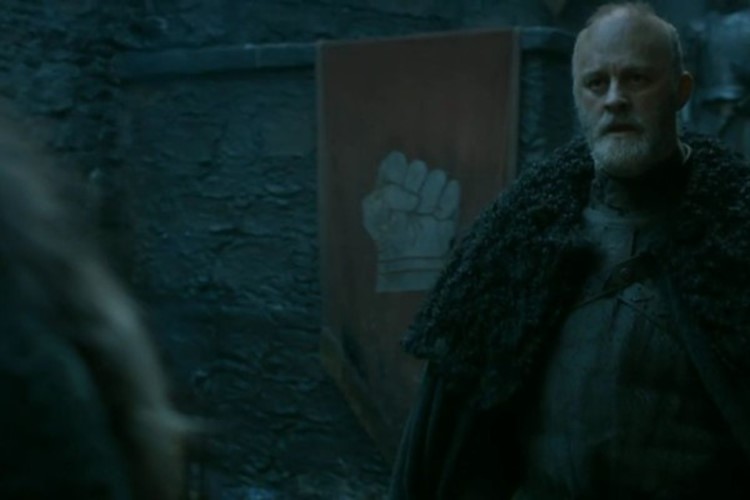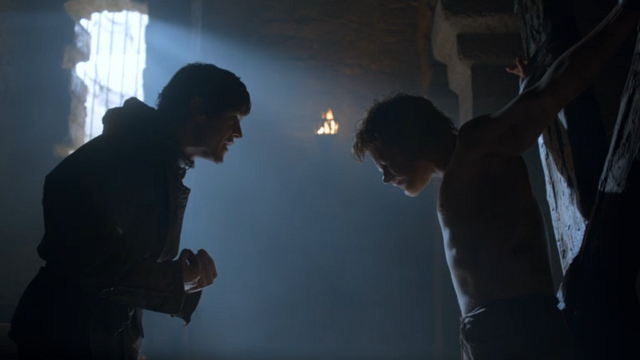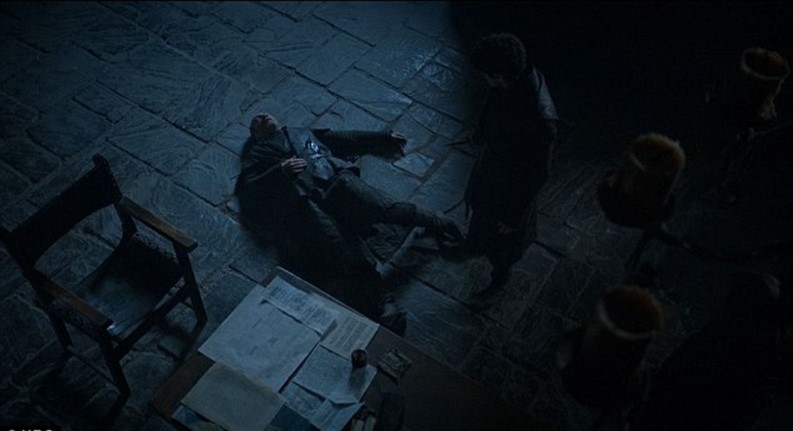Would A Medieval Think Ramsay Bolton Was All That Bad?
June 26, 2016 in Editorial

Spoilers for Season 6 of Game of Thrones.
We never thought that a character could be quite so unlovable as Joffrey; but then along came Ramsay, with his torturing, twisted sense of humour, and dubious family dynamics. To the modern viewer Ramsay is the epitome of the worst of medieval times. But what would a medieval Englishman have thought?
If you had to list reasons to hate Ramsay, then reason #1 is that Ramsay tortures people. His house’s banner is the flayed man, and where Ramsay goes suffering follows.
But.
When we meet the Glovers for a few minutes during the middle of episode seven, they had been helped by the Boltons to get their castle back, with no malice or anger towards the Boltons. Clearly their lands hadn’t been ravaged or people raped; so the Boltons are able to support their allies with minimal human rights abuses. The Bolton’s barbarism is only directed at their enemies. Which was, tragically, common medieval practice, because of castles and money.

Medieval warfare was not primarily about pitched battles, but was overwhelmingly focused on siege-craft. William the Conqueror for example (the Norman who showed up in 1066 and never left) was at war for most of his life, but only ever fought in two pitched battles; the rest of his time was spent attacking or defending castles. The trouble was, sieges were ruinously expensive because they lasted so long. Modern armies are hired all year round, and so it doesn’t make much difference if the soldiers are sitting in their barracks or outside someone else’s throwing rocks and babies. Medieval armies however were hired when needed, then sent away again. So if there’s no siege, then no army. With a siege, you need an army for months or years to sit outside the walls. Edward III racked up such big military debts that he had to promise not to leave Flanders without permission, and put the Crown Jewels up as collateral.
So to help reduce costs, you need to either force your enemy to come out of their castle and meet you, or intimidate them into surrendering. And both of these options involve looting, pillaging, burning and terrifying the local population. The horrible thing for the modern reader? It worked. Maybe not forever, but certainly on the order of years. When William the Conqueror took England, the North rebelled against him. He pillaged the lands so badly that people resorted to cannibalism to survive, and 20 years later the population was a quarter of what it had been. The result: The North gave no trouble. Edward III slaughtered peasants across the south of Scotland in 1356, and earned himself two decades of peace.
Killing, butchering and raping peasants was just something that happened; and a medieval would probably not particularly notice.
Aside from killing peasants then, what of Ramsay’s treatment of his captives?
This is slightly more complicated. Ramsay has high-value prisoners (Sansa but, mainly, Theon), and has them tortured. Was this just normal medieval practice?

Not even close. Peasants were fair game, as they didn’t matter. But important prisoners would be ransomed back to their families for huge sums of money, and this was the main way in which medieval warfare could be profitable for the victor. (If you capture a king, then the ransom could be multiples of the annual income of the realm).
There were, of course, exceptions. Sometimes someone valuable is in your hands because they’re a hostage. For example, defenders of a castle might say “we will surrender in three months, unless someone arrives with a relief army by then” and would hand over hostages when the deal was made. If the defenders broke their truce, then these hostages would be executed. Edward III hanged a boy, Thomas Seton, in front of the boy’s father outside Berwick castle for example, for just such a reason.
The torture or murder of a captive however, particularly by someone of royal status, was extremely rare. King John tried to have a captive (the teenage Arthur of Britanny) blinded and castrated; the jailer refused the order, and John’s subsequent murder of Arthur made John into a pariah, and may well have lost France for John.
This isn’t to say that torture didn’t happen. After all, Edward I invented hanging, drawing and quartering. But this was done in public, after a trial. After Magna Carta, the English were guaranteed protection of life and limb until proven guilty.

Which brings us to what many viewers might have thought was a common medieval scene; family members killing each other to take the throne, as Ramsay did with his father. However, in England at least, a son never killed his father to take the throne. Family feuds did happen: William the Conqueror’s own son Robert rebelled against him, and so William laid siege to the castle. During a combat in the siege, William’s horse got shot from under him. Robert then gave his dad a horse to escape on.
Peasants died fighting William, but when Robert had William at his mercy, he let him go (while all around, knights and peasants fought and died).
Overall then? Ramsay’s pillaging and widespread “casual” torture of civilians would have barely registered with the medieval. His torture of Theon would have been outrageous and despicable, and the murder of his own father unforgiveable. He would most likely have been remembered like King John. Cruel, with the occasional streak of military brilliance, but overall unfit for rule.
References and suggested reading:
The Perfect King: The Life of Edward III, Father of the English Nation, Ian Mortimer (2006)
The Norman Conquest, Marc Morris (2012)
The Plantagenets, Dan Jones (2012)
A Great and Terrible King: Edward I and the Forging of Britain, Marc Morris (2008)
Find out how much it would cost to feed Drogon here. And over in Middle Earth take a look at the economics of Mordor here.
Stay in touch:



Rory, your comment is actually a better article than the article you’re commenting on. You already made the points I intended to make.
Note: Arthur of Brittany wasn’t just a hostage, he was John’s nephew. John was an a-hole in any century.
I think you’re vastly overestimating the barbarity of the medieval period, much as the show itself does.
Before that, the point that pitched battles were less important than sieges is highly contentious and probably wrong. How are you even defining important? There are a great number of conflicts that were resolved primarily or even entirely by pitched battles. The Wars of the Roses (supposedly an influence on the series and GRRM’s books) featured few important sieges. It was at the battle of Wakefield in 1460 that the Duke of York died, forcing his son to claim the throne itself rather than just the succession. At the battle of Barnet in 1471 Warwick the Kingmaker was killed, and at Tewkesbury that year that Henry VI’s heir was killed, ending that phase of the Wars. Henry VII’s campaign against Richard III also ended with a battle at Boswroth, and Henry’s conflicts with the pretender Lambert Simnel also ended in battle at Stoke in 1487. To my mind, only a few sieges occurred during the Wars of the Roses, and none of them decisive (the two battles of St Albans were not true sieges, as they didn’t not involve attacking fortifications, but were more battles in the streets and causeways of a city).
Whilst you’re correct that murdering one’s father or torturing a noble prisoner would be seen as heinous, so would attacking the general populace, particularly one’s own people. I am not contesting that it happened, it most certainly did. Whole families, like the Percies and Douglases along the Anglo-Scottish border built their careers on reiving. I am contesting that it was something “a medieval would probably not notice”.
The primary duties of a medieval king were the distribution of justice and the defence of the realm. If you were to read one of the rebel manifestoes that survive from, for example, Cade’s Rebellion in 1450, you would find that one of the frequent criticisms of the relevant king’s rule was that he was failing to administer justice fairly. Evil counsellors had been allowed to exact illegal taxes and corrupt the courts, thereby escaping judicial punishment for their crimes. When Robert II of Scotland was removed from direct power by his son, John, Earl of Carrick, in 1384 one of the stated reasons was his failure to administer justice. For years the king had failed to control his son, Alexander Stewart, the Wolf of Badenoch, who had been ravaging the north of Scotland in his conflict with the bishop of Moray, killing peasants, stealing cattle, and burning crops. Failure to protect one’s people was clearly a major infraction. Failure to prevent this was justification to force a king to step aside and allow a guardian to rule on his behalf.
In Ramsay’s case, he goes one further, and actually attacks his own people. William the Conqueror’s Harrying of the North, which you mention above, was a similar case: someone raiding lands that they controlled. It was widely criticised by chroniclers. Simeon of Durham’s early-twelfth century chronicler described the rotting bodies left behind by William’s campaign and the famine that followed as “horrific”. Orderic Vitalis, another twelfth century chronicler, describes the Harrying as William having “punished the innocent with the guilty” and saying that he “cannot commend” the king because of this cruelty. Clearly, not all “medievals” overlooked pillaging or dismissed it as par for the course.
You might answer that these are the opinions of chroniclers, secular or monastic, and therefore don’t reflect the attitudes of the Commons that suffered these attacks. But even if that were the case, it’s simply implausible that a Scottish ‘peasant’ whose land was raided by, for example, Edward III, would not feel some enmity towards him. Donald MacDougall would not stand outside his burnt croft in 1356, seeing a troop of English sergeants march away carrying his wife Mairi and his cow Bessie, and shrug his shoulders saying “Whelp, that’s just war. Better head to the market tomorrow and get another one.”
Finally, what your article overlooks is whose peasants and lands are being attacked. Whilst they are all indirectly or directly held from Ramsay, Lord Paramount of the North, much if not most of them will belong to the other houses of the North. An attack on these lands and people would hurt these other lords. Who will bring food to the Glovers if their tenants are dead and their fields burnt? How will they raise money to support themselves if there is no produce to tax? It was in the nobility’s interest to protect their lands and tenants, these were the people that gave them food, money, and bodies to fight with. The other Northern Houses should have been itching to overthrow Ramsay. Admittedly, this is a failing of the show, not your article. The idea that any lord could be as tyrannical as Ramsay and get away without even a minor rebellion from their nobles is highly dubious. One only has to look at the kings deposed in medieval England to see that. Both Edward II and Richard II were removed for, among other things, being tyrannical. They refused to compromise with the nobles and ruled over them, rather than with them.